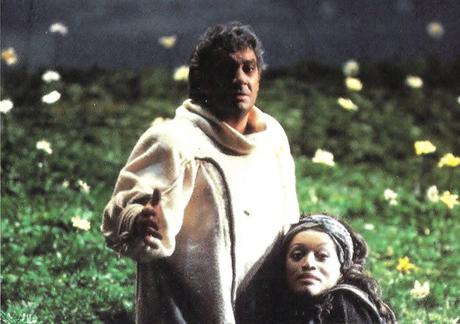by Paul J. Pelkonen

Placido Domingo and Jessye Norman as Parsifal and Kundry
in the old Met production of Wagner's Parsifal.
Photo detail from the album cover of the
1994 Deutsche Grammophon Parsifal © 1994 DG/UMG and the Metropolitan Opera.
However, this year I realized that my choice must be a difficult one: the 1994 set made by the Metropolitan Opera under the baton of its now-disgraced former music director James Levine. Mr. Levine, whose career was effectively destroyed last December when allegations of his sexual assaults upon teenage boys came to light, is a controversial figure right now. He was fired from the Met last month and the wounds are very fresh.
Then again, Parsifal is all about wounds and healing. In the opera, the King of the Holy Grail lies wounded and bleeding, forced to relive his injury over and over as he performs the daily ritual blessing of the Holy Grail. His attacker, the magician Klingsor is a victim by his own hand. The knight Gurnemanz relates how Klingsor, who wanted to join the order of Grail Knights, unmanned himself in an effort to control unimaginable and abhorrent lusts. Having failed in that, he has become the great enemy of the temple and the agent of its possible destruction.
Earlier this month, Mr. Levine and his attorneys filed suit against the Met and its current general manager Peter Gelb. The suit refutes the allegations and claims defamation and unfair dismissal of the conductor by the Met administration. The documents claim that Mr. Gelb "brazenly seized on these allegations as a pretext to end a longstanding personal campaign to force Levine out of the Met." In response, the Met's attorney has stated that Mr. Levine was fired for "credible and corroborated evidence of sexual misconduct."
Yep. This is starting to sound like Parsifal, all right. Back to the opera.
Listening to this performance, one notes the absolute and glacial pace of the music as the clarinets and bassoons play those little ornamental descending arpeggios. The tremor of fear that runs through the skin as the theme unfolds itself for a third time over the nervous tremolos in the strings, and then the song of the cellos doubling wind, reaching, yearning and striving towards an invisible Holy Grail that stays just out of reach.
Moving on to the Transformation Scene that comes halfway through the first act, and the design of the Levine approach becomes clear. The long note values are taxing to the players but they open up a deliberation ad clarity that allow one to hear the harmonies and bass underneath. Never do the notes become overextended. When the brass enter, intoning the opera's opening motif, their weight is palpable, a precursor of the electronically enhanced, terrifying bells of Montsalvat that follow.
The Act III Prelude is a slow, treacherous climb from the depths of the depravity explored in Klingsor's Magic Garden and an account of Parsifal's journey bearing the Spear of Longinus, the weapon that pierced the side of Christ on Good Friday. It is torturous stuff, with Wagner stretching the meaning of chromaticism to its absolute limit. And yet it is the prelude to healing and ultimately salvation, as Parsifal heals Amfortas and replaces the flawed ruler.
Elsewhere on this blog, I argued that the Met's coronation of Yannick Nézet-Séguin as the company's new music director, and the decision to extend his contract so it starts this year and not in 2020 is an important step forward. That elevation coincided with Mr. Nézet-Séguin conducting a Parsifal of his own and doing so superbly well that the Levine story briefly vanished from the opera headlines. And yet, with this lawsuit pending, neither the conductor or his former opera company will find any kind of redemption or salvation.
That kind of stuff only happens in opera.

